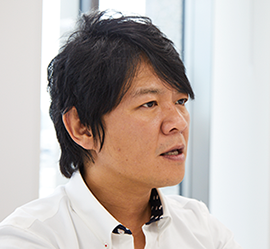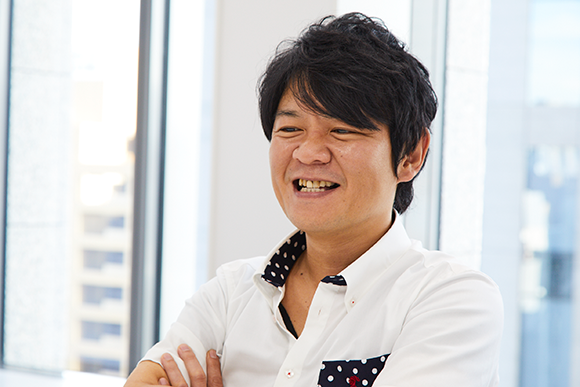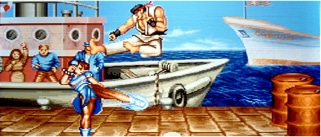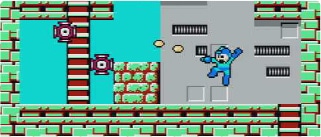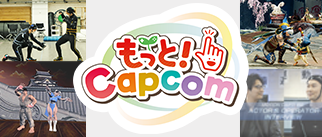- First of all, as there are likely still people out there who are unfamiliar with the series, please tell us what you consider to be the appeal of Monster Hunter.
- Monster Hunter is a series of action games centered around exploring vast natural environments and working with friends to hunt down fierce monsters. When designing these games, we have always focused on the idea that ANYONE can join in on the fun. It’s not only about having our players enjoy the hunting action, but giving them unique choices and innovative, fun ways to play. With each new title, we’re really working to fill players with a sense of excitement.
- And it seems the idea that “anyone can join in on the fun” really took off here in Japan, and spurred a sort of “Monster Hunter phenomenon.” It’s joined the ranks of the most well-known Japanese games.
- In 2007, we released Monster Hunter Portable 2nd for a handheld system, which sold over one million copies and was very well received. I think a large part of that success was the social aspect, because you could play it cooperatively with others, and it was no problem even for beginners to join in.
- So you’ve been able to maintain support domestically, but how have you been approaching the global market?
- We’ve already released a few titles globally. Among these, Monster Hunter 4 Ultimate was the first Monster Hunter title to sell over a combined one million copies in North America and Europe.
- What kind of demands have you had from players as you’ve started marketing your series globally?
- Many of our players in Japan have enjoyed these titles on portable systems, but we’ve also had a fair number of fans asking for home console releases. We’ve had similar feedback from our fans overseas, where it’s common for people to spend large parts of their day at home, meaning they have lots of time to play games on their home consoles. We’ve also heard from many players who would like to enjoy our games in their own languages.
- So, it sounds like expectations are high all around the world.
- There are numerous Monster Hunter fan communities, in Japan and worldwide, and there are even fans who have supported us for over 10 years. It’s those communities and those fans who have helped shape what Monster Hunter is today.
- Would you say that those fans’ demands are what prompted the move to home consoles for this new title?
- We’ve always wanted to bring Monster Hunter to a larger global audience, and have just been waiting for the right time to do it. We believed that a simultaneous worldwide release would be necessary to achieve that. Thanks to the efforts of everyone on our management and development teams, both in-house and external, we were able to make a worldwide home console release a reality.
- How did players react to your announcement at E3 2017 in Los Angeles this past June?
- This was the first time we announced an all-new Monster Hunter title at E3. When we made the announcement, the audience erupted in applause and cheers. On a personal level, I was ecstatic.
- Only on a personal level? How about on a management level, as the game’s producer?
- No one in my position, of overseeing the management of the series, can be professionally content at this stage. We’ve only just announced the game, and though we’re off to a good start, we have to stick together as a development team and keep striving to improve the quality of our game until its release. Not only that, but it’s our duty to continue to appeal to fans and new players alike by holding promotional events around the world. Seeing the response at E3 was a good reminder of the importance of those goals.
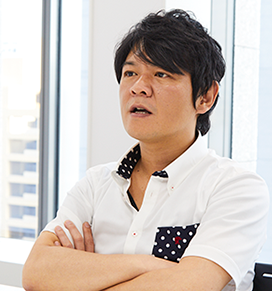
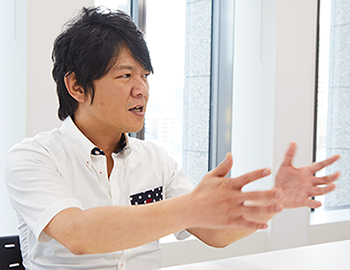
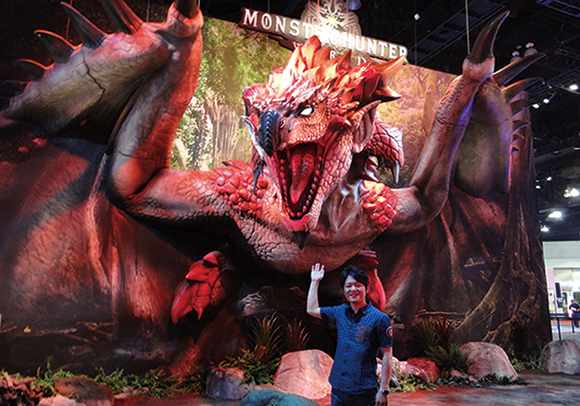
- Please tell us your thoughts on developing Monster Hunter: World for home consoles.
- Of course. Our concept for Monster Hunter: World was to take the series’ tried-and-true atmosphere and gameplay, which has been built up over years, and push it to its next stage of evolution. We’re using state-of-the-art technology to bring the graphics, AI, and other elements up to global standards.
- Why did you decide to include “World” in the title?
- We always approach the titles of our games with a theme in mind. This time, we decided on “World” instead of a numbered title, because it captures our idea of using the latest technology to bring the Monster Hunter “world” to life, and of bringing Monster Hunter to the “world” stage. We also thought that a numbered title would sound intimidating for new players, so we felt quite strongly about expressing the “World” concept in our title.
- Your goal is to use the latest technology to bring about the next evolution of Monster Hunter. Will this change any aspect of how players have enjoyed the series up to now?
- The action-focused gameplay is basically unchanged; we haven’t altered the core concepts that have been around since the series’ beginning. We’ve kept the heart of the game strongly intact, but we’ve taken that basic Monster Hunter foundation and built upon it with new concepts that will excite our players.
- That should come as a relief to players who are nervous about how the game has evolved.
- Our fans know the series extremely well, and I realize there might be people who are afraid that World is going to be a completely different game than before. To those fans, I can promise that we are making a Monster Hunter. We said the same thing to those who were worried that the new ledge-jumping features in Monster Hunter 4 would negatively affect the game.
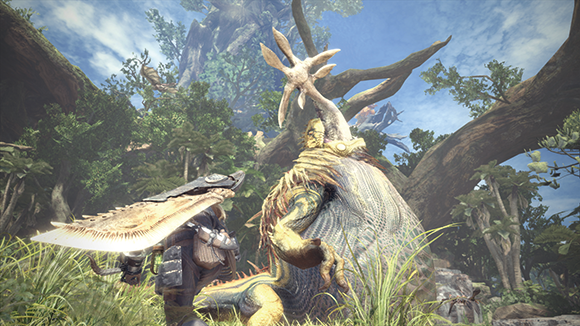
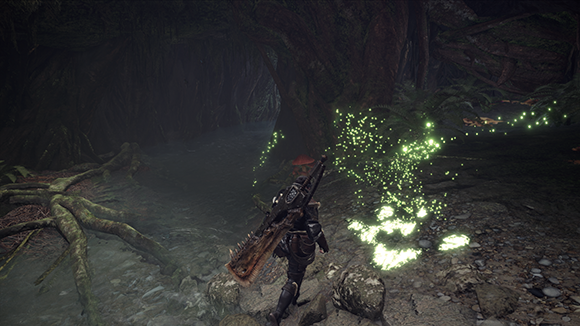
- Next, please tell us about some of the new game system features for World.
- The game system has vastly improved thanks to hardware and game engine upgrades. Until now, you would go out on a quest and there would be a loading screen transition when moving between areas in the map. In Monster Hunter: World, however, we’ve modified movement and action to be more seamless. This allows our players to enjoy a far more liberating style of play.
- It sounds like the sense of immersion when going on hunts has really evolved.
- I believe that the desire for excitement is the same worldwide as it is in Japan, and I think we’ve loaded our game with lots of features that will truly excite people from all corners of the world.
- What other new system features are there?
- We’re planning on having worldwide online matchmaking.
- So players will be able to overcome language barriers to play with others overseas?
- Right. You can play with up to three other players during a quest, and while you can choose to play with players of any language, you can also choose a filter setting that will match you with only players of your own language. We’ve also taken great pains in our development process to work closely with our in-house localization staff, putting more effort into “culturalization” and making tweaks to the nuance and style of the text and dialogue in each language.
- Wasn’t it difficult to plan for so much player diversity during development?
- We did need a certain team size, and did have some costs due to the differences in our approach to making the title and our team’s organization. We’re very grateful to the company for their support, and for allowing us to utilize the latest technology to create this game.
- What new features have you added that will appeal to both series veterans and newcomers alike?
- Monster Hunter: World will make good use of voiced tutorials. These tutorials will make it easier for new players to understand the mechanics of the game while they play, without breaking immersion. There are also other features that will make it easier for new players, like the training area we’ve added where you can test out the game’s weapons.
- It sounds like you’re really looking to expand the player base.
- One of our focuses right now is on disseminating the Monster Hunter brand worldwide, making new fans out of people who have never played Monster Hunter before. We want to expand our player base and continue to grow the brand by putting out more animated features, merchandise, and by holding more events. We enjoy a good bit of popularity in Japan, but we don’t want to assume that that’s always going to be the case.
- The series seems very well known, even among children and the youth demographic. Is there really much reason to feel worried?
- The times change, people change, and the number of people who have never experienced Monster Hunter continue to grow. We simply want to continue reaching out to new players, and give the world a game that can be enjoyed across generational gaps, by parents and children alike.
- Please give us your final thoughts on Monster Hunter: World leading up to its release.
- We’ve created Monster Hunter: World as the epitome of hunting action, keeping the fundamental feeling of excitement that’s always been a part of the series, while making it accessible to more people across the globe, and utilizing the latest technology to develop a game with more freedom than ever before. This title has been a big challenge for us, but just as the name suggests, we’re confident that this game will really open up the Monster Hunter “world” to everyone across the globe.
